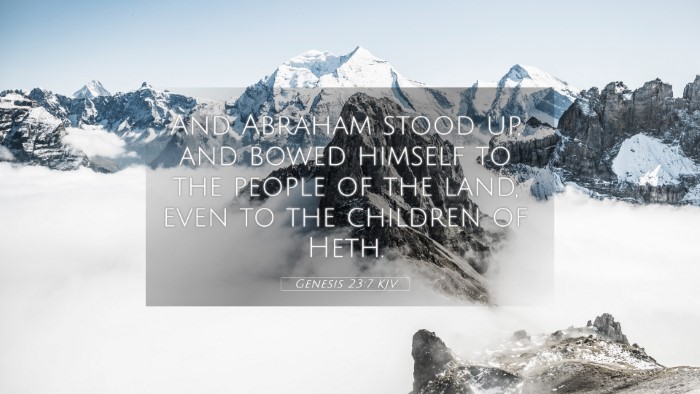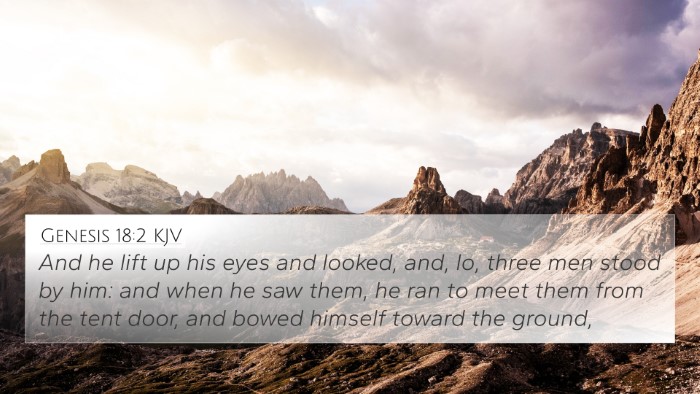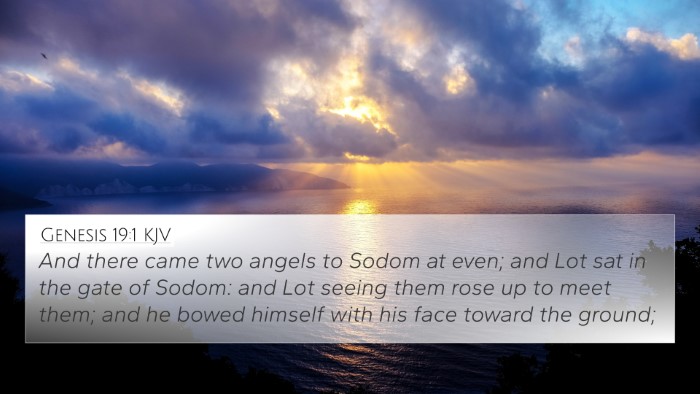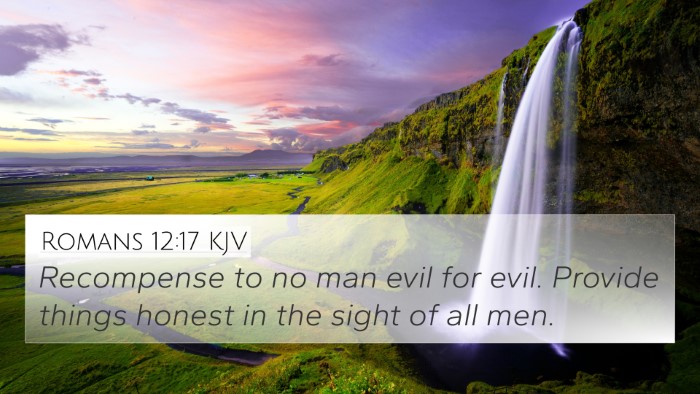Understanding Genesis 23:7
Genesis 23:7 recounts an important moment in the narrative of Abraham, where he addresses the Hittites to purchase a burial site for Sarah. This interaction is rich with cultural and spiritual significance and bears several implications. By examining the verse through various public domain commentaries, we can draw out deeper insights and connections to other Scriptures.
Verse Text
“And Abraham stood up, and bowed himself to the people of the land, even to the children of Heth.” - Genesis 23:7
Commentary Insights
Matthew Henry's Commentary
Matthew Henry emphasizes the humility and respect shown by Abraham in his dealings with the Hittites. He notes that by bowing, Abraham demonstrates a recognition of their authority and status in the land. This act of reverence also underscores the importance of cultural customs in negotiations. The moral here relates to showing prudence and civility in our engagements with others.
Albert Barnes' Notes
Albert Barnes points out that Abraham's approach to the Hittites showcases his understanding of the land's customs. His bowing signifies his desire for a peaceful transaction and reflects his status as a sojourner. This moment foreshadows the future of Israel in this land, which will be significant in the unfolding of the biblical narrative.
Adam Clarke's Commentary
Adam Clarke highlights the diplomatic aspect of Abraham's conduct as he seeks to secure a permanent resting place for his wife. Clarke suggests that this interaction symbolizes a transition from mere sojourning to establishing a connection with the land, which has theological implications regarding God’s promises to Abraham's descendants.
Thematic Connections
This verse connects to several themes and is linked to various other scriptures:
- Respect and Humility: Proverbs 15:33 - "The fear of the Lord is the instruction of wisdom, and before honor is humility."
- Covenant and Promised Land: Genesis 17:8 - "And I will give unto thee, and to thy seed after thee, the land wherein thou art a stranger, all the land of Canaan, for an everlasting possession; and I will be their God."
- Burial and Heritage: Job 1:21 - "Naked came I out of my mother's womb, and naked shall I return thither: the LORD gave, and the LORD hath taken away; blessed be the name of the LORD."
- Negotiation and Integrity: Proverbs 16:7 - "When a man's ways please the LORD, he maketh even his enemies to be at peace with him."
- Land Ownership in Scripture: Hebrews 11:9-10 - "By faith he sojourned in the land of promise, as in a strange country, dwelling in tabernacles with Isaac and Jacob, the heirs with him of the same promise."
- Diplomatic Communication: Acts 15:29 - "That ye abstain from meats offered to idols, and from blood, and from strangled, and from fornication: from which if ye keep yourselves, ye shall do well. Fare ye well."
- Faith in Action: James 2:24 - "Ye see then how that by works a man is justified, and not by faith only."
Cross-Referencing Biblical Texts
Understanding Genesis 23:7 within the wider context of Scripture allows for fruitful analysis and revelation:
- Inter-Biblical Dialogue: This encounter not only highlights Abraham’s personal integrity but also reflects God's overarching plan for His people through time.
- Figurative Connections: The act of purchasing land can be seen as symbolic of the future acquisition of the Promised Land, reinforcing the covenant between God and Abraham.
- Reflection on Mortality: The act of securing a burial site compels one to consider themes of mortality and legacy, mirrored in Ecclesiastes 3:20.
- Social and Legal Customs: The negotiation process illustrated here is echoed in other biblical accounts, like the purchase of a field in Jeremiah 32:9.
- Contextualizing Interaction: This moment can be linked to the New Testament in how believers engage positively with the world while remaining true to their faith, as seen in 1 Peter 2:11-12.
Application of Commentary and Cross-References
Genesis 23:7 serves as a pivotal moment in Abraham's journey of faith. The respectful negotiation indicates that the faithful life involves both humility and integrity. By aligning this moment with other scriptures, one can appreciate the deeper truths of faith, legacy, and God’s promises. The understanding drawn from these commentaries and cross-references enriches our biblical interpretation and provides practical wisdom for our everyday interactions.
Conclusion
The study of Genesis 23:7 not only opens the door to understanding Abraham's character and faith but also reinforces the importance of respectful relationships within the communities we inhabit. As we consider the connections between Bible verses and the theological implications, we gain insights that enhance our spiritual journey and deepen our appreciation of the Scriptures as a comprehensive tapestry of God's word and purpose.








